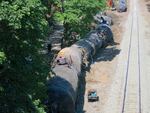
A 16-car oil train derailment caused a fire and left a small oil sheen on the Columbia River.
Conrad Wilson / OPB
The black Union Pacific oil cars that derailed Friday in the Columbia River Gorge are lined up next to the tracks that cut through Mosier, like oversized, crumpled beer cans discarded with little regard.
Crews spent Monday continuing their cleanup efforts, pumping crude oil out of the derailed cars into tanker trucks that drove the oil away from the scene. Around mid-morning, officials turned their efforts to newly discovered oil in a pipe leading from Mosier's water treatment plant to the Columbia River.
"The main sewer line that leads to the wastewater treatment plant was damaged during the derailment," said David Byers, the Washington state Department of Ecology response manager.
So far, cleanup crews have cleaned about 10,000 gallons of crude oil out of the town's sewage system. Another 32,000 gallons burned off or vaporized in the initial crash, was captured by booms in the Columbia, or soaked into the soil.
Related: Oregon Leaders Call For Moratorium On Oil Trains In Gorge
“I don’t have an exact volume for you, but it’s a very small amount of oil that entered the Columbia River,” Byers said.
He said the additional oil was found in a vault connected to a pipe that runs between the treatment plant and the river. Byers said the way it’s designed has kept the oil from reaching the river.
On Monday, officials also gave a better sense of the events they think lead to the 16 car derailment that left a small oil sheen on the Columbia River over the weekend.
Raquel Espinoza, a spokeswoman with Union Pacific, said preliminary findings lead the company to believe there was an issue with the tracks.
“It appears a fastener that connects the rail tie with the rail could’ve contributed to the cause, but we are still looking at different pieces of evidence,” she said.
Union Pacific said it made repairs to the track after the crash.
Some industry experts said they are skeptical that that alone could be the cause of a derailment that size.
Thomas Frederick, an officer with the Brotherhood of Locomotive Engineers in Seattle, said it sounded implausible.
"I would say that one rail fastener could be a contributing factor. But it’s got to be more than just that,” said Frederick, who has 27 years of experience as an engineer.
Related: 5 Things You Need To Know About The Oil Train Derailment Along The Columbia River
A boil water ban was lifted Monday after tests confirmed the city's water was safe to drink. Still, residents are being asked to limit toilet flushing and long showers — even as temperatures exceeded 90 degrees for the third straight day — because the water treatment plant is offline and all sewage is being sent by truck to Hood River for treatment.
On Sunday, for the first time since the derailment, Union Pacific started running trains along the Oregon side of the Columbia River Gorge and through Mosier.
br />
At a community meeting Sunday, the City Council passed a resolution that asked the railroad to wait until all the crude oil was removed from the derailed cars before sending more trains because of concerns about safety.
In some places in Mosier the trains pass slowly within just a few feet of the derailed tankers.
“The tracks are no safer today then the day that this derailment happened and now we have large tankers of fuel sitting between the track and our town,” said Emily Reed, the council president for the city of Mosier.
Union Pacific said they’ve been working with the city, but the railroad also has obligations to other clients that it must meet.
“We have a lot of companies that are depending on Union Pacific to get their products,” said Espinoza. “We have done our best to reroute what we can, but unfortunately there is just a lot of people that are waiting for their goods.”
So far, at least 10 trains have passed through Mosier since resuming after the derailment. No crude oil trains are scheduled to pass through for the next week, but Espinoza said that’s more a function of scheduling than any deliberate action taken by the railroad to avoid sending crude through Mosier. She said the railroad plans to resume normal operations soon.
“I understand how they feel and I just want them to know that we’re doing everything that we can to correct the situation and to make sure that we operate in the safest manor,” she said.
In a joint statement Monday, Oregon Gov. Kate Brown along with Sens. Jeff Merkley and Ron Wyden, as well as Reps. Earl Blumenauer and Suzanne Bonamici called for a temporary halt to oil train service through the Gorge.
Related: Mosier Fire Chief Calls Shipping Bakken Crude Oil By Rail 'Insane'
"Oil train tankers are still lying on their sides in Mosier, the ground and water have yet to be cleaned up, and there's still no good explanation for the cause of Friday's crash," the statement said. "It is too soon to resume oil train traffic through the Columbia River Gorge."
The elected leaders called on Union Pacific to hold off on sending oil trains through the Gorge until they can give Mosier residents a concrete explanation of what caused the accident and "assurance that the company is taking the necessary steps to prevent another one."
Still, some who live in the gorge are less convinced any assurances can make oil trains safe.
Hood River Mayor Paul Blackburn said it's not lost on him that the oil train derailment could've been in his community.
"These rail lines move right through our little towns," Blackburn said. "With the exponential growth of oil trains coming through these little towns is this really a very good idea?"
